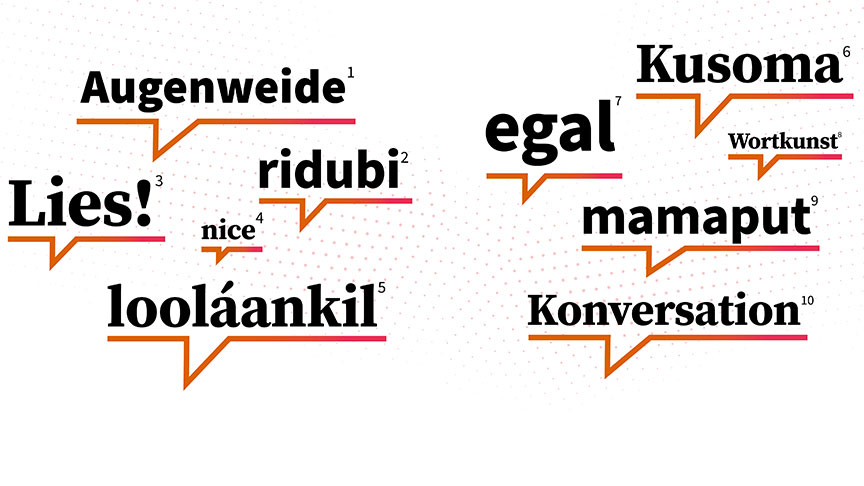
© DAAD
1 Professor Hebatallah Fathy: “I also like the words Geborgenheit, Narrenfreiheit and Hoffnungsschimmer.” 2 Professor Martina Schrader-Kniffki: “This is a metaphor derived from the Zapotec noun ‘dubi’, which refers to a rolled-up banana leaf. The word ‘ridubi’ is a verb meaning ‘to connect’, ‘join together’ or ‘merge’; it symbolises a culture-specific form of social union and the linguistic link between social interactions and nature.” 3 Professor Naima Tahiri: “Being the first word of divine revelation in Islam, for me it symbolises a striving for education and the fight against ignorance.” 4 Professor Heike Wiese: “It was young people in particular who first used this word; they are internationally networked to a much greater extent nowadays on social media. Recently, however, I also overheard it when I was in a bank – used by a somewhat older clerk who was talking to a client. This shows that we no longer allow ourselves to be confined by supposed linguistic boundaries – which I think is pretty nice.” 5 Letter editor: “The Yucatec Maya verb ‘to bloom’ is comprised of the noun ‘lool‘ (‘flower’) and the ending ‘-áankil’. The latter is an affective ending, used to describe the opening movement of flower petals.” 6 Professor Florence N. Indede: “This is a Kiswahili word meaning ‘to read’ something literally, though it also implies ‘learning’ and the ‘acquisition of knowledge’.” 7 Evans Musyoka: “‘Ist egal’ is simply a convenient expression that can be used in many conversational contexts.” 8 Professor Gesine Schiewer: “Used in particular by Arno Holz, this term refers to semantic sensitivity and intensive work with and on languages in literature, everyday life, academia and other linguistic contexts.” 9 Dr. Gerald Heusing: “This word from Nigerian English refers to a female street seller with a small stall and shows how creative speakers and languages are. The derivation of the word always makes me smile. It comes from the way that customers usually order food: they say ‘Mama, put…’ to the woman running the stall, and indicate the dish they want.” 10 Anna Greilich: “Conversations are the best way to discover the world.” —
